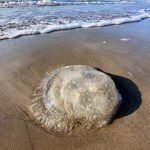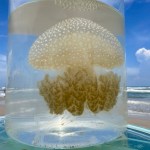Beachcombing: Australian White Spotted Jellyfish Wash Up Along Texas Coast
Published 4:15 am Tuesday, July 29, 2025



While out on the beach this week for my regular Beachcombing survey, I spotted several striking jellyfish drifting ashore — Australian white spotted jellyfish, an invasive species that’s now making waves along the Texas coast.
These jellyfish are hard to miss, with their dome-shaped, semi-translucent bells covered in bright white dots. Underneath, thick, stubby oral arms give them a bulky appearance unlike the more delicate jellyfish we’re used to seeing in the
Gulf.
Scientifically known as Phyllorhiza punctata, this species is native to the western Pacific Ocean but has invaded new areas — including the Gulf — by hitching rides in the ballast water of cargo ships. Though they may look intimidating, their sting
is mild and usually not felt by humans.
Trending
The jellyfish I encountered this week ranged from 12 to 18 inches across, which is typical for the species, but they can grow even larger, some reaching more than two feet wide. They feed by pulsing their bells to move and to draw water through their bodies, filtering out plankton, fish eggs, and other tiny particles as they drift through the surf.
While they may seem like a harmless curiosity, these jellyfish pose a real threat to local ecosystems. As an invasive species, they can outcompete native jellyfish and other filter feeders for food, especially impacting shrimp and juvenile fish
populations. Their seasonal appearances may also be linked to warming ocean temperatures and shifting currents.
Despite lacking a brain, these jellyfish use a simple nerve net and balance-sensing statocysts to navigate their surroundings. They typically live for a few months up to a year depending on environmental conditions — and yes, they are edible, considered a delicacy in parts of Asia.
If you spot one of these invasive jellyfish along the beach, snap a photo and share it. Your sightings help scientists track their spread and understand the growing impact of non-native marine species in the Gulf.
Jace Tunnell is the Director of Community Engagement for the Harte Research Institute at Texas A&M University-Corpus Christi. His Beachcombing series appears on YouTube and you can follow Jace at harteresearch.org, or Facebook (facebook.com/harteresearch), Instagram (@harteresearch) and X (@HarteResearch) (the platform formerly known as Twitter).









